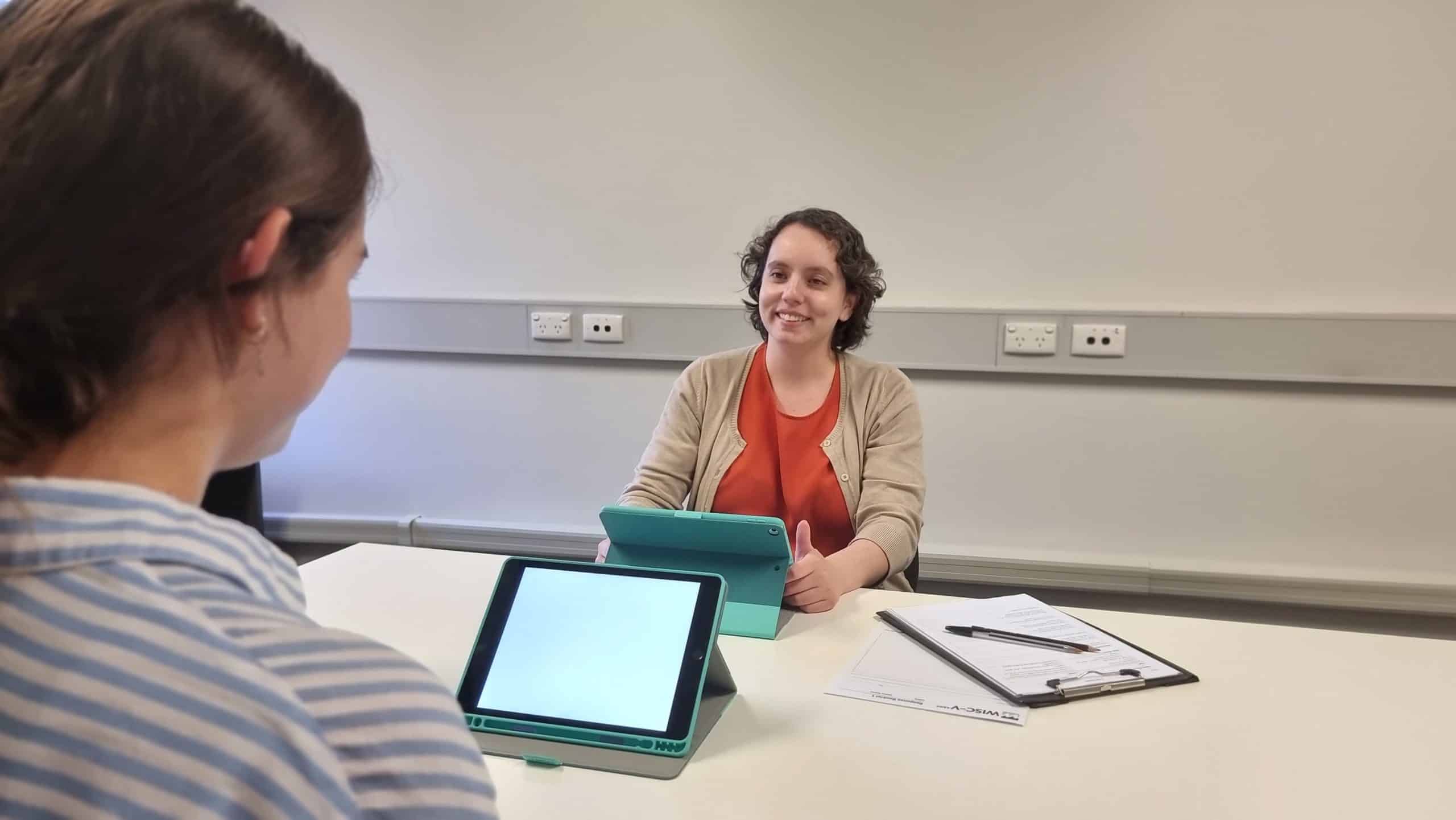
Anxiety is associated with feelings of worry, nervousness, or apprehension. Everyone feels anxious sometimes. It is normal to feel nervous or anxious about a variety of situations, like just before an exam or when doing something new. For example, children, especially those with learning difficulties, can feel anxious about attending and returning to school after a break.
There are lots of things you can do to help your child manage their anxiety and support their wellbeing. We have put together 5 tips and a list of resources to help you and your child.
When anxious feelings don’t go away, are very intense, and happen a lot of the time, interfering with everyday life, it is important to seek further support. A good first step is to talk to your general practitioner (GP) to discuss what types of treatment and support is available. Psychologists and other mental health services provide therapies for anxiety. Psychologists can be found through the AAPI Find a Psychologist or APS Find a Psychologist | APS services.
There are many great resources available. Below is a list of some organisations that offer support, information, and strategies to support children experiencing anxiety.
Kids Helpline
Ages 5–25 years
Call 1800 55 1800 (24/7)
WebChat (24/7) – waiting times apply
Email counselling – inbox is checked 8am–10pm AEST, 7 days
Beyond Blue
Ages 16+ years
Call 1300 22 4636 (24/7)
WebChat support service (24/7)
Email support service (reply within 24 hours)
Lifeline
All ages
Call 13 11 14 (24/7)
The Brave Program
Ages 3-17 years
A free interactive, online program for the prevention and treatment of childhood and adolescent anxiety, with information tailored for parents and children of different age groups.
Emerging Minds
Anxiety in primary school-aged children - Emerging Minds
Supporting a child with anxiety - tips for parents
8 tips to help your child manage back-to-school anxiety - Emerging Minds
Professional anxiety support for children - tips for parents
Raising Children Network
Anxiety and children with disability | Raising Children Network
Anxiety in children and childhood fears | Raising Children Network
Beyond Blue
Anxiety signs and symptoms - Beyond Blue
Understand Anxiety disorders - Beyond Blue
Headspace
How to help support young people with anxiety | headspace
ReachOut
FAQ about teen anxiety for parents | Anxiety and teenagers
How to build coping skills for anxiety | Anxiety and teenagers

A psychoeducational assessment is used to identify strengths and weaknesses, diagnose Specific Learning Disorder (e.g., in reading, often called Dyslexia) (based on the DSM-5-TR criteria) if appropriate, and make evidence-based recommendations to improve learning outcomes.
A psychologist will conduct the assessment and write a detailed report with recommendations to support learning.
At Speld Qld we offer assessments to explore people’s learning and provide a report and recommendations on how to support their learning.
Our scope is focused on supporting people’s learning rather than applications for other services. However, you are able to provide our reports to any other services that you may be working with.
Background Questionaire
A background questionnaire will be sent to you prior to the assessment with a consent form and an optional questionnaire for you to pass onto a teacher and/or tutor to complete. Send through any other previous assessment reports (e.g., psychology, speech language, hearing tests), school reports, work samples, or other information you may have to speld@speld.org.au.
Interview
An initial interview will be completed on the day or prior to the assessment if needed to gather additional information.
IQ/Cognitive Assessment
An IQ/Cognitive assessment will be completed as part of the assessment to investigate cognitive strengths and weaknesses.
Academic Achievement Assessment
An academic achievement assessment will be completed to investigate literacy and numeracy skills.
Comprehensive Report
A report will be provided to you within 6 weeks of the assessment. If for any reason this is not possible, the psychologist will discuss this with you. Occasionally, complexities with a report or time waiting for additional information can cause delays outside this 6-week timeframe. The report will include the findings and recommendations, including relevant resources, strategies, and accommodations.
Feedback Session
You will be offered a 20-minute feedback session via a phone call or video conference to discuss the report. You can invite other people to join this feedback session (e.g., teacher). Any requests for extra feedback sessions for other stakeholders (e.g., school) can be discussed with the psychologist and may incur an extra fee.
Prior to your appointment
The psychologist will gather important background information through a background questionnaire and may also request school reports, work samples and teacher feedback. The week before the assessment Speld Qld or the psychologist will contact you by text, email, or phone to confirm your appointment and discuss any key questions they have prior to the assessment day.
Arrival
We recommend that you arrive 15 minutes prior to your appointment time at the Speld Qld office. The psychologist will meet you in the waiting room at the time of your appointment.
Initial Interview
The psychologist will have an initial interview with you to gather further information and explain what the assessment session will look like. This typically takes 5 – 15 minutes.
Assessment
The assessment session can often take 2-4 hours in total. The psychologist will talk to you about the assessment and offer breaks during the assessment as needed. You can bring water and snacks for the assessment and breaks.
After the assessment
The psychologist may wish to speak to you about the assessment session and gather additional information. They will also discuss when the assessment report will likely be completed.

Speld Qld psychologists will use a range of tools as part of the psychoeducational assessment including standardised assessments, direct observation, and history. Assessments and tools that may be used include:
IQ cognitive
Academic achievement
Questionaires
Other assessments
Observations
Background information and reports from parents, teachers and specialists
What does the assessment diagnose?
Psychoeducational assessments can be used to diagnose a Specific Learning Disorder. Speld Qld uses the DSM-5-TR diagnostic criteria (Diagnostic and Statistical Manual of Mental Disorders) when investigating Specific Learning Disorder. There are specific criteria that need to be met, which means not everyone that experiences difficulties with literacy or numeracy meets criteria for a Specific Learning Disorder. However, recommendations will always be provided to support areas of strength and areas of difficulty. Someone can have a Specific Learning Disorder with impairment in reading, written expression, or mathematics (or a combination of all three). There are also specific patterns of difficulties that are often referred to as Dyslexia or Dyscalculia.
The other disorder that may be diagnosed following an assessment is Intellectual Developmental Disorder (Intellectual Disability). The psychologist will discuss this with you and additional questionnaires may need to be completed if it is required.
At Speld Qld our psychoeducational assessments do not provide diagnoses of other mental or neurodevelopmental disorders (e.g., Generalised Anxiety Disorder, ADHD, Autism Spectrum Disorder, Developmental Coordination Disorder, etc.). If symptoms associated with other disorders are indicated, the psychologist will give recommendations to investigate it further with the relevant health professional.
If the psychologist suspects attention difficulties are impacting on learning they may suggest completing the Conners 4 Rating Scales. They may also recommend to see a paediatrician (or psychiatrist) to investigate ADHD and provide a diagnosis if appropriate.
What happens if we are sick on the day of the assessment?
Call Speld Qldas soon as possible so that we can reschedule your appointment.
What happens if the psychologist is sick on the day of the assessment?
Speld Qld will let you know as soon as possible and reschedule or reassign your appointment to a different psychologist.
What happens if the assessment is unable to be completed on the day?
There can be a range of reasons why an assessment may not be able to be completed, such as illness, engagement, behaviour, or social-emotional responses (e.g., high anxiety). If this happens, the psychologist will speak with you about what the most appropriate next steps will be. This could include taking a break, a trusted person (e.g., parent) sitting in, rescheduling to another day, or adjusting the appointment to a consultation with recommendations on how to access support until an assessment is able to be completed.

The Speld Qld Team of Education Advisors receive hundreds of calls each year where parents, carers and guardians report that their child is being supported well in their school setting. The classroom teachers are aware of the young person’s additional needs and are making suitable adjustments to ensure their access to the curriculum is on an equitable basis.
Unfortunately, we also speak to quite a number of frustrated parents who report little awareness of, or support for children with either a diagnosed, or yet to be diagnosed learning need, or a learning difference that impacts their progress. In this, and all cases to be honest, we recommend parents advocate for their children’s needs.
For parents in this context, advocacy means getting support from another person to help you express your views and wishes, and help you stand up for your child’s rights. What that means in the real world is that you might need to become a persistent, possibly slightly annoying parent which the school knows will follow up how and when adjustments are being accessed and will chase them up if they are not made available.
The reason to advocate for your child’s needs, apart from ensuring your child has equitable access to the curriculum, is that the school has an obligation to make relevant adjustments to support individuals. These are legislated in the Disability Standards for Education (2005) and the Disability Discrimination Act (1992). The Queensland Curriculum and Assessment Authority (QCAA) outlines their principles of Equity in education on their website.
The QCAA is committed to Queensland students accessing a fair and just, inclusive education which provides:
As our team often say to parents, a lot of the value in the psychoeducational assessments carried out by our psychologists is that the assessment reports have recommendations and strategies that schools should be able to take and implement in a straightforward manner. The assessment reports are valuable as the strategies line up with those reasonable adjustments in bold above, that can help pupils access their education on the same basis as their peers.
Improving your understanding of your child’s additional need and the ways a school can support them is always going to help. Please remember that understanding the causes and effects of, for example, dyslexia is very useful. However, there is no generic dyslexic pupil, so the support that is needed is going to be very individual to each individual.
The assessment report will provide a list of recommended and individualised supports which are based around the person’s individual profile. These supports are recommended to support the individual who was assessed. For example, having a reader and a scribe available may be useful for some, their use may not be appropriate for all.
Check the recommendations and strategies, ask the person being supported what works for them, then approach the school with a list of effective supports that can work for your child.
Schools have staff who may change roles, or are replaced. Pupils progress through each academic year and build relationships with a new team of teachers as they go. New faces mean that your child’s needs will need to be passed on to whoever is currently best placed to support them. Hopefully, your school’s learning support team will make new staff aware of any additional support needed, possibly through the use of a learner profile (the name of which will vary between school settings).
In case your child’s needs are not distributed, email staff at the beginning of each year, semester, or term, or in the run up to an exam block. Outline the supports that are currently working for your child, or update staff on how those needs have changed. As pupils develop, their support needs can change so please check in with your child to ensure the supports you are advocating for are still useful, and listed in the most current assessment report.
If you are heading into a meeting with your school, prepare a list of questions or points for discussion. Before you leave the meeting check that any items that need to be actioned have a follow up date, hopefully with a suitable person to provide feedback. Remember, you are part of a team working toward improving the adjustments provided to your child, but also the other pupils in their class who may also need support.
Self advocacy by pupils is a great thing to work toward. If your child is happy to let staff know the adjustments they need, it can build ownership, independence and confidence. However, classrooms are busy places, staff can be seen as scary and unapproachable and the desire to not stand out may be overwhelming. Encourage self-advocacy, but it may arrive in very small steps.
It is likely to be a long and stressful journey but any advocacy by you that can ensure relevant adjustments are consistently in place will take a big cognitive load off your child. Knowing they can go through their school day using strategies to reduce or work around their additional need removes a big stressor from pupils that may already be struggling to keep up.
Be that slightly annoying parent who will pop up in a teacher’s inbox, or in person to remind them that some of their pupil needs a bit more support. When they understand that the easiest way to not have to deal with you is to support the pupils in their class, hopefully adjustments will be consistently in place.
Parents and caregivers should consider seeking a learning assessment for their child when they notice signs that suggest the child may be struggling or have unmet needs academically, socially, or developmentally.
Below are some common indicators and scenarios where a learning assessment might be beneficial:
Academic Challenges
Behavioural and Emotional Indicators
Developmental Delays
Teacher or School Recommendations
Signs of Specific Learning Disorders or Attention Issues
Transitions or Life Changes
Parental Instincts
_______________________________________________________________________________________________________________________
Next Steps
If you are still concerned about your child’s learning:
1. Consider a learning assessment to identify specific areas of strength and difficulty and the most appropriate interventions. The assessment report will also recommend other professionals who may be able to support your child (e.g., tutor, speech pathologist, occupational therapist, paediatrician).
2. If your child’s academic difficulties persist for at least six months despite targeted intervention (at school or with a tutor):
b. Continue to monitor your child's progress.
c. Speak to Speld for information regarding next steps and supports, including access to specialist teachers, the Speld library, and the Speld Advisory Line.
Remember - early intervention is key to addressing learning challenges, building confidence, and ensuring your child has all the tools and support needed to learn.
Helpful Links:
Speld Qld Advisory Line
https://speld.org.au/advisory-line/
Ph: (07) 3391 7900
7 Tips for Meeting with Your Child’s School
https://codereadnetwork.org/wp-content/uploads/2023/10/7-Tips-for-meeting-with-your-childs-school.pdf
11 Questions for dyslexia friendly schools
https://codereadnetwork.org/wp-content/uploads/2023/10/Code-Read-11-questions-for-dyslexia-friendly-schools.pdf
NCCD
https://www.nccd.edu.au/for-parents-guardians-and-carers
Decision-making Flowchart for Learning Assessments
